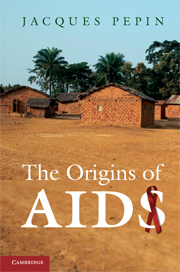Book contents
- Frontmatter
- Contents
- Figures, maps and table
- Acknowledgements
- Abbreviations
- Note on terminology
- Introduction
- 1 Out of Africa
- 2 The source
- 3 The timing
- 4 The cut hunter
- 5 Societies in transition
- 6 The oldest trade
- 7 Injections and the transmission of viruses
- 8 The legacies of colonial medicine I
- 9 The legacies of colonial medicine II
- 10 The other human immunodeficiency viruses
- 11 From the Congo to the Caribbean
- 12 The blood trade
- 13 The globalisation
- 14 Assembling the puzzle
- 15 Epilogue
- References
- Appendix Classification of retroviruses
- Index
2 - The source
Published online by Cambridge University Press: 05 June 2012
- Frontmatter
- Contents
- Figures, maps and table
- Acknowledgements
- Abbreviations
- Note on terminology
- Introduction
- 1 Out of Africa
- 2 The source
- 3 The timing
- 4 The cut hunter
- 5 Societies in transition
- 6 The oldest trade
- 7 Injections and the transmission of viruses
- 8 The legacies of colonial medicine I
- 9 The legacies of colonial medicine II
- 10 The other human immunodeficiency viruses
- 11 From the Congo to the Caribbean
- 12 The blood trade
- 13 The globalisation
- 14 Assembling the puzzle
- 15 Epilogue
- References
- Appendix Classification of retroviruses
- Index
Summary
So, HIV-1 originated from central Africa. But then, one may ask, why central Africa? The answer, as we will see, is because this region corresponds to the habitat of the simian source of the virus.
Our closest relatives
Chimpanzees are the closest relatives of humans, sharing between 98 and 99% of their genome with us, and are considered the most intelligent non-human animal. Chimpanzees and humans shared a common ancestor and are thought to have diverged between four and six million years ago. In fact, chimpanzees are so close to humans that it was recently proposed to move them into the genus Homo. Long-term studies in the Gombe reserve of Tanzania revealed that, like humans, chimpanzees have their own personalities. Some are gentle, others are more aggressive. Some have a good relationship with their parents or other members of the troop while others are loners. Some have a strong maternal instinct, others do not. This marked individualisation and their ability to laugh are what make chimpanzees most like humans. Rather than reacting predictably and instinctively to a given situation, chimpanzees show intelligence and spirit and experience all kinds of emotions.
- Type
- Chapter
- Information
- The Origins of AIDS , pp. 18 - 31Publisher: Cambridge University PressPrint publication year: 2011



